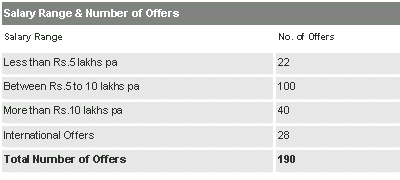|
Indian School of Business - whither brother? As the dust settles over the much-hyped launch of "tailor-made for success" B-school a.k.a. Indian School of Business, the initial news from the ISB campus is not very encouraging - neither for students nor for the applicants. It seems that ISB could not choose much worse time to start its operations in India. With a world-class infrastructure, who's who of management world as faculty and top companies as promoters, nothing could have been better for ISB but the time. And it seems the time is against it. The school shifted to distant Hyderabad when Mumbai govt. wanted a reservation for state. That put it away from the finance capital of India. Launch was well planned but ran into an unexpected recession. With a downturn in world economy and recession in US, even the godfathers sitting in plush New York offices couldn't do much except doling out a few benevolent offers. And within two years, the school has seen two deans in the office. Since the start of the ISB, there has been an intense debate with the alumni, faculty and MBA aspirants about IIMs Vs ISB dilemma. And it seems the debate will linger on for a while. While ISB has been able to line up an extremely impressive faculty and international infrastructure & exposure, the placements at ISB have not been able to keep pace with the developments because of overall downturn in the economy. So far, it seems that IIMs, because of their well-established alumni networks and historical affiliations, are managing much better show than ISB. This year, though placements at IIMs have not been that good, but still there was no dearth of foreign offers, and the over-all median salary climbed with 100% placements reported at all IIMs. At ISB, this year's data is partially available, as ISB follows rolling-placement model, and the complete picture will emerge only after May 2003, but if we compare data of class of 2002 of ISB & IIMs, ISB seems to be settling down within four IIMs (A,B,C,L). The Class of 2002, the first batch of the ISB graduates received 193 offers of employment; of them, 28 were for overseas positions. The salary details for the class of 2002 are as follows:
Source: http://www.isb.edu/pgp/apply/index_apply.html?topic=placement_sts.html Highest salary offers at ISB for foreign postings and Indian posting were USD 220,000 and Rs. 28 lakhs respectively compared to USD 155,000 and Rs. 13.5 lakhs offered at IIMA. The average salary at ISB for foreign posting was USD 68,000, and for Indian posting, it was Rs 8.5 lakhs. For IIMA, average foreign salary was around USD 76,000, and Indian salary was around 5.8 lakhs. While all IIMs in year 2002 managed 100% placement, at ISB 10 students were left unplaced. On the upper side, ISB performed much better than IIMs but on an average salary ratio its performance was at par. Moreover, with the all-time high tuition cost of Rs. 11.62 Lakhs (that includes Rs. 40,000/- for Laptop lease for a year), the ROI for ISB seems to slide into negative territory as average cost for an IIM degree is around 3 lakhs and the average salary is around 5.6 lakhs, while for ISB, cost of tuition is 11 lakhs, while average salary is 8.5 lakhs. If the overall structure of IIMs and ISB is compared, it seems that it will be grossly unfair to compare these two institutions, as the offerings are vastly different. While IIMs are more geared towards younger population, ISB caters to an audience, which is mature and experienced. At IIMs, the average age is around 24 and average work-ex is around 18 months. However, at ISB the profile is much different. "If you are an engineer with more than 7 years of work-ex and you are more keen to change your career, then IIMs is not the place for you," says Shailesh Vickram Singh, former Editor of CoolAvenues Career HelpLine!. "The senior people who wish to pursue MBA after a certain work experience or wish to change career, shall either go abroad or try for ISB, as IIMs are not geared towards senior population pursuing MBA," he adds further. Moreover, worldwide B-Schools placements data are into negative territory for last two years and so to judge ISB so fast will be grossly unfair. However, the debate and doubt among MBA aspirants will continue to be on as they try for their next GMAT or CAT, but one thing is clear, ISB is not for less than 3 year work-ex MBA aspirant. For them, IIMs will turn out to be much cheaper and equally attractive option, But for senior executives, they shall try for either ISB or go for MBA from some Ivy league MBA school abroad and then probably ISB might look much cheaper compared to Harvards & Whartons… CoolAvenues' Editorial
Click here to Debate on latest trends of Placements 2003 as the saga unfolds itself.
Read complete story of Placement 2002 as it happened along with analysis and comparison across the B-Schools and segment-wise analysis.
Read complete story of Placement 2001 as it happened along with analysis and comparison across the B-Schools and segment-wise analysis.
Read complete story of Placement 2000 as it happened along with analysis and comparison across the Indian and US B-Schools and segment-wise analysis. Mail your comments at: webmaster@coolavenues.com |
|
